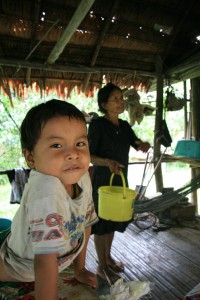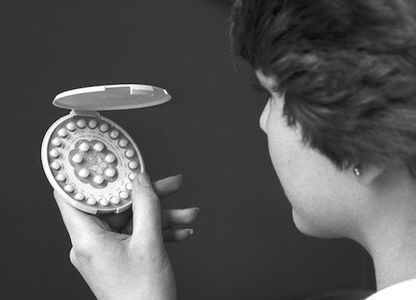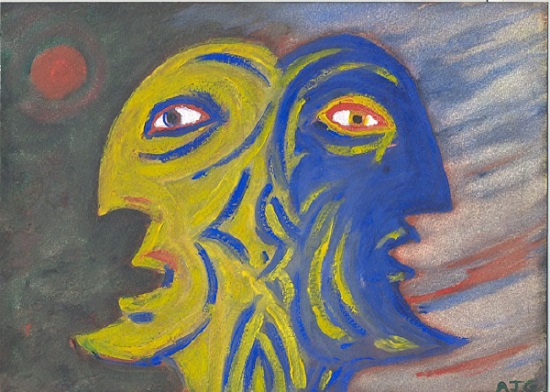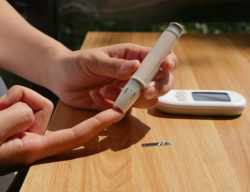The morning after I picked up my discharge papers from the Marine Corps, I boarded a plane bound for Peru. After 4 years of being told where, when and what to do, I decided that the best plan was to have no plan. Against the advice of my direct supervisor, parents and a lot of friends, I left for 2 months with the attitude, whatever will be, will be.
On the first morning in Lima, I met Dany, a tour guide – sorta, in my hostel. In America our tour guides accompany large groups of people around cities explaining the historical significance of buildings and areas. In Peru, tour guides have licenses, but their tours can be a little less formal. I was a single woman in a foreign country where I didn’t speak the language and I accidentally hired Dany as my personal guide along the Amazon for 2 weeks (I misunderstood and thought I was joining a group already going – oops! Whatever will be, will be).
We flew from Lima into Iquitos and from Iquitos took a riverboat along the Amazon for 15 hours. Not intentionally trying to get off the beaten path,  I was the only gringa on the boat. The children were as fascinated with me as I was with them. We got off in a town with some electricity and running water thanks to an abandoned missionary. After a quick lunch, Dany hired a couple to take us on a peka-peka (a hand carved canoe with a little motor on it that made the sound, “peka-peka”) further into the abyss. A few hours down a smaller river and deep into the rainforest, we stepped onto the muddy bank and walked into a village of about fifty or sixty people. There was no electricity or running water and some of the younger children had never even seen a white person before.
I was the only gringa on the boat. The children were as fascinated with me as I was with them. We got off in a town with some electricity and running water thanks to an abandoned missionary. After a quick lunch, Dany hired a couple to take us on a peka-peka (a hand carved canoe with a little motor on it that made the sound, “peka-peka”) further into the abyss. A few hours down a smaller river and deep into the rainforest, we stepped onto the muddy bank and walked into a village of about fifty or sixty people. There was no electricity or running water and some of the younger children had never even seen a white person before.
 We stayed with the village elders and the children came over to play with my hair, draw pictures in my journal and try to communicate with the strange, tall white woman who had mysteriously shown up with Dany. I tried their various foods and discovered that the Amazonian miracle foods that are sold here aren’t even comparable to the true miracle foods in the jungle. Down there food is life and life is a miracle. During my time in the rainforest, I learned that virtually everything that we can cure with a magic pill in America can be treated with a root or leaf brewed into a tea or soup. On the third day, I started to develop the symptoms of a urinary tract infection and was concerned that if left untreated it could travel into my kidneys. I explained to Dany my concerns about being so far away from a doctor or hospital if the infection got worst. He explained to me that he went to school in Iquitos to learn about medicinal plants before moving to Lima to become a tour guide. Dany placed his hand on my lower back, on my stomach, felt my forehead and said my kidney’s felt warm. He made a delicious tea of roots, berries and leaves and within an hour my symptoms were alleviated. I didn’t have any further problems during the whole trip. On another morning I complained of a headache and Dany concocted a remedy for it as well. It was clear that these people didn’t need health insurance, doctors, hospitals or pharmaceuticals. They simply weren’t plagued with incurable diseases like cancer, Alzheimer’s, or autism.
We stayed with the village elders and the children came over to play with my hair, draw pictures in my journal and try to communicate with the strange, tall white woman who had mysteriously shown up with Dany. I tried their various foods and discovered that the Amazonian miracle foods that are sold here aren’t even comparable to the true miracle foods in the jungle. Down there food is life and life is a miracle. During my time in the rainforest, I learned that virtually everything that we can cure with a magic pill in America can be treated with a root or leaf brewed into a tea or soup. On the third day, I started to develop the symptoms of a urinary tract infection and was concerned that if left untreated it could travel into my kidneys. I explained to Dany my concerns about being so far away from a doctor or hospital if the infection got worst. He explained to me that he went to school in Iquitos to learn about medicinal plants before moving to Lima to become a tour guide. Dany placed his hand on my lower back, on my stomach, felt my forehead and said my kidney’s felt warm. He made a delicious tea of roots, berries and leaves and within an hour my symptoms were alleviated. I didn’t have any further problems during the whole trip. On another morning I complained of a headache and Dany concocted a remedy for it as well. It was clear that these people didn’t need health insurance, doctors, hospitals or pharmaceuticals. They simply weren’t plagued with incurable diseases like cancer, Alzheimer’s, or autism.
Fortunately, I have always had great health and have never had to take a long-term prescription. I drink plenty of water, get plenty of sunshine, and hardly ever take OTC medications. However, now I wonder if I will ever be quick to reach for a bottle or prescription in the future. According to the CDC approximately half of Americans are on at least one prescription and many on multiple. Furthermore, CNN reports that: “Today, the United States consumes most of the world’s supply of opioid painkillers. By 2010, enough opioid painkillers were prescribed to medicate every American adult around-the-clock for a month. And every year, nearly 15,000 people die from overdoses involving these drugs… more than from heroin and cocaine combined.” And it’s not just the pharmaceutical companies that spent nearly 60 BILLION DOLLARS in 2004 on advertising, twice as much as they spent on research and development; last year the outgoing chairman of Aetna, the third largest health insurance company in the US, got a 68.7 MILLION DOLLAR farewell package. Is there a place for conventional medicine in my life? Yes, but only as a secondary resource or when it’s obviously necessary (I recently cut my hand open on glass and had to get stitches – in the jungle they probably would have wrapped it up in a leaf and I would have survived all the same). I go to doctors appointments prepared to fight the “take a pill, numb the symptom” approach to my health. Thanks to ProPublica, there is now a database which lists doctors that are on big pharma’s payroll. This database is not all-inclusive yet, but is growing and now list 761.3 million dollars of disclosed payments to doctors from 12 different pharmaceutical companies.
The lesson I learned in the Amazon wasn’t “down with pharmaceutical companies and western medicine,” although I do question our societies pill popping problem. The lesson was that health starts  with our diet and lifestyle. We can’t all move to the Amazon or harvest and market their indigenous plants for our benefits, but we can learn from their way of life. The families that I briefly lived with woke up with a clear purpose each day – to survive. Their day was spent repairing their huts, farming, hunting, and caring for one another. They laughed, unfortunately a lot of it was at the silly gringa. They were out in the sun, drank water instead of soda, lived without cell phones, wireless Internet and computers everywhere they went. I don’t know if they live longer than we do, but I know they lived healthier lives without new diseases that can now be cured with a pill. The first thing I did when I came home was get rid of my smartphone and make it a daily habit to disconnect from the virtual world at least once a day. I also eat more whole foods, ask my doctor to find and fix the problem not the symptom, and I laugh, a lot, everyday.
with our diet and lifestyle. We can’t all move to the Amazon or harvest and market their indigenous plants for our benefits, but we can learn from their way of life. The families that I briefly lived with woke up with a clear purpose each day – to survive. Their day was spent repairing their huts, farming, hunting, and caring for one another. They laughed, unfortunately a lot of it was at the silly gringa. They were out in the sun, drank water instead of soda, lived without cell phones, wireless Internet and computers everywhere they went. I don’t know if they live longer than we do, but I know they lived healthier lives without new diseases that can now be cured with a pill. The first thing I did when I came home was get rid of my smartphone and make it a daily habit to disconnect from the virtual world at least once a day. I also eat more whole foods, ask my doctor to find and fix the problem not the symptom, and I laugh, a lot, everyday.
We Need Your Help
Hormones Matter needs funding now. Our research funding was cut recently and because of our commitment to independent health research and journalism, unbiased by commercial interests, we allow minimal advertising on the site. That means all funding must come from you, our readers. Don’t let Hormones Matter die.
Yes, I’d like to support Hormones Matter.
Photo Credit – Lisbeth Prifogle, 2009
This article was published originally in October 2014.











